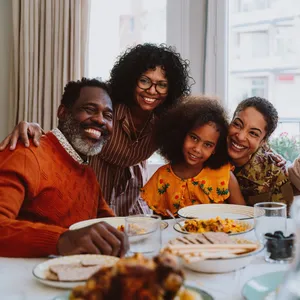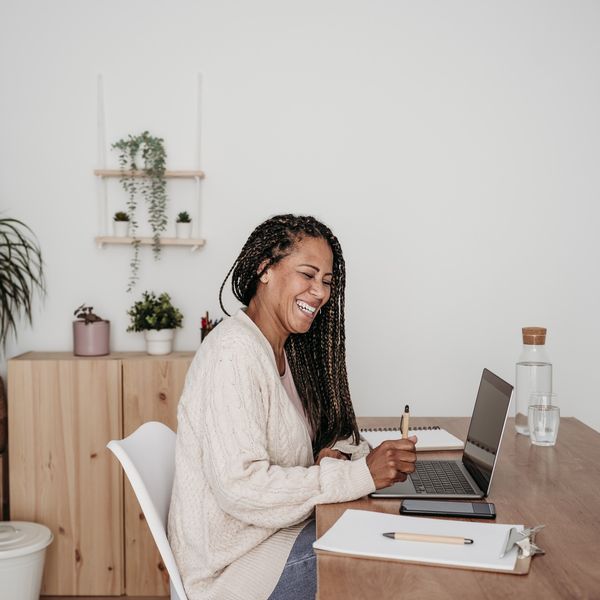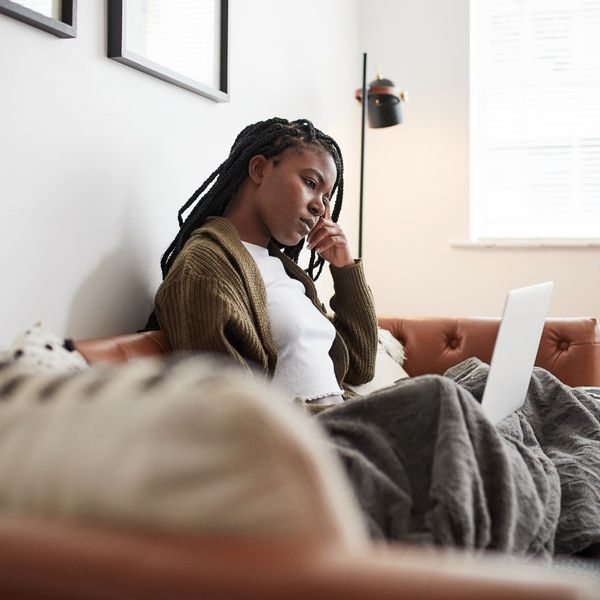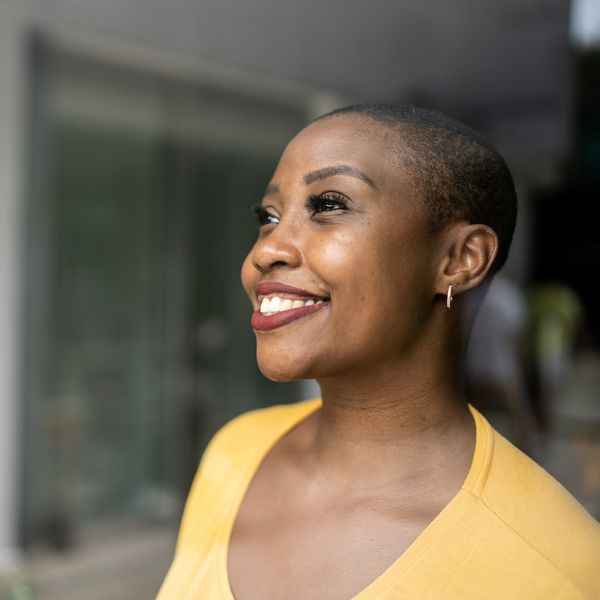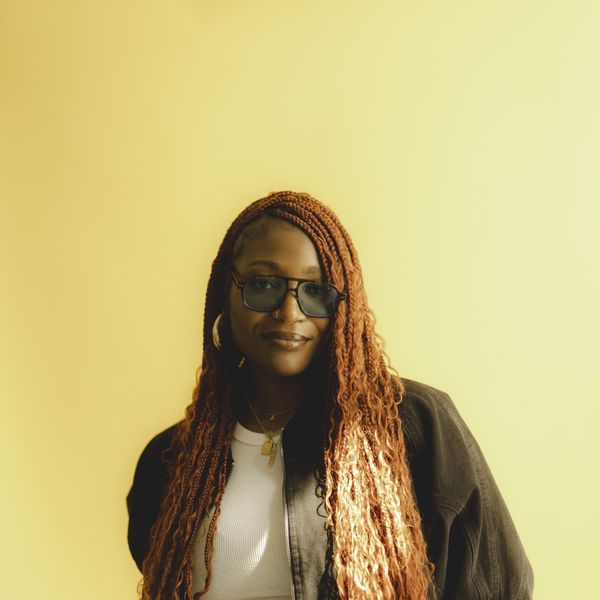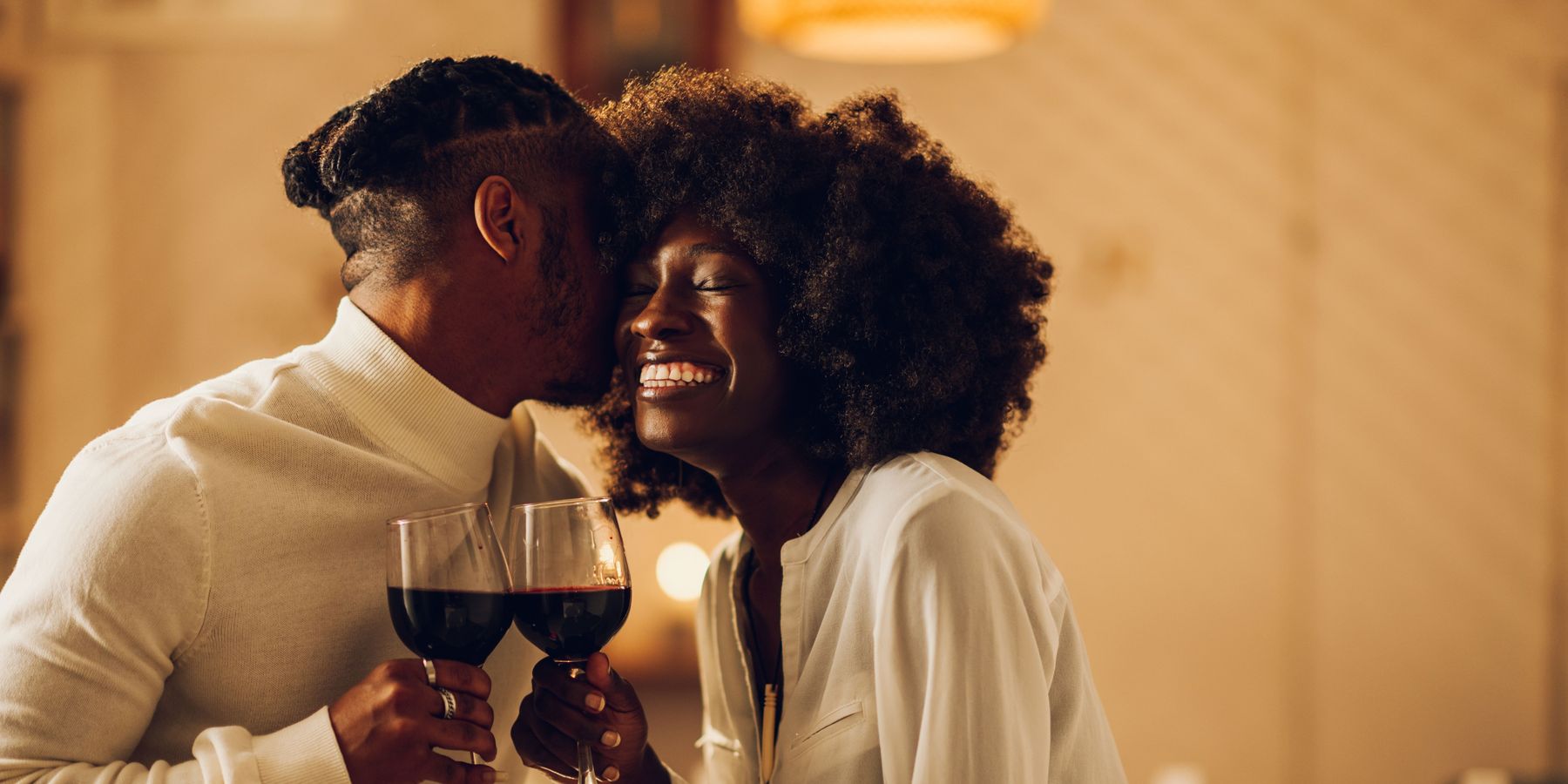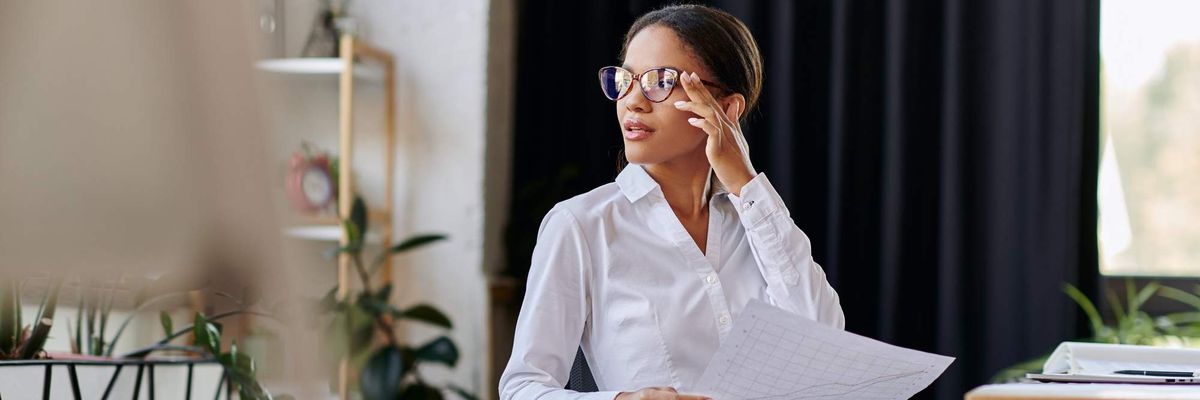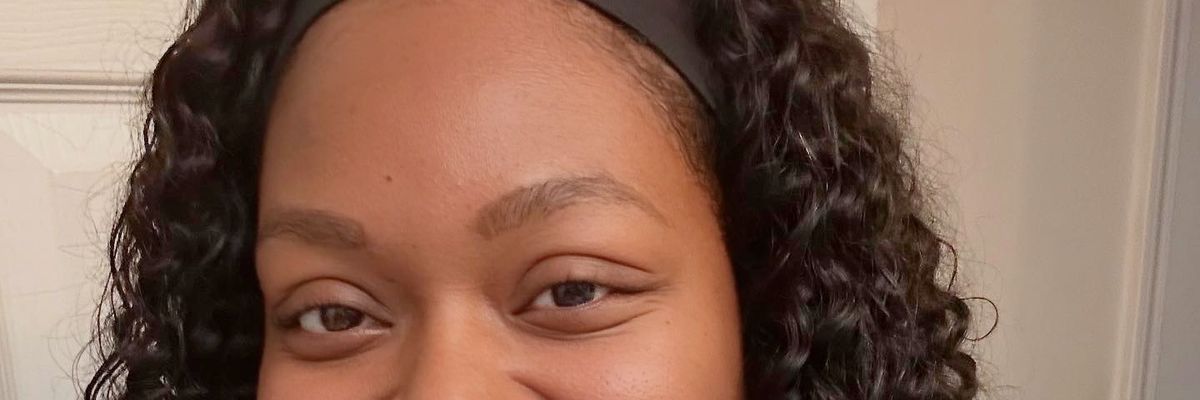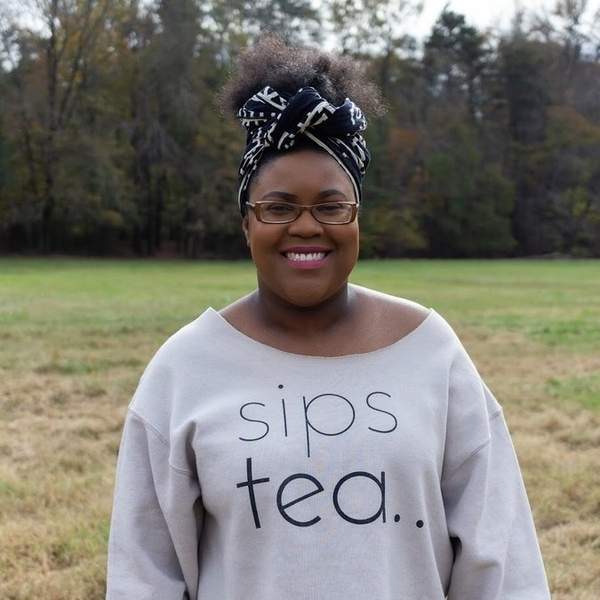
What if you could combine all the things you love about hip-hop with a way to take better care of yourself? If that sounds like your cup of tea, then meet Shanae Jones the Hip-Hop Herbalist.
She is the founder of Ivy's Tea Company, a hip-hop influenced holistic health brand with a collection of handcrafted herbal teas and herb-infused sweeteners. Her products have taken a life of its own with catchy names like #TrapTea and equally clever descriptions that instantly reel customers in, but it's the delicious taste and sweet aroma that keeps them coming back for more.
This former executive assistant turned entrepreneur/herbalist shares her journey from working with a Quaker lobbying organization to creating safe spaces for black women and men in the holistic industry.
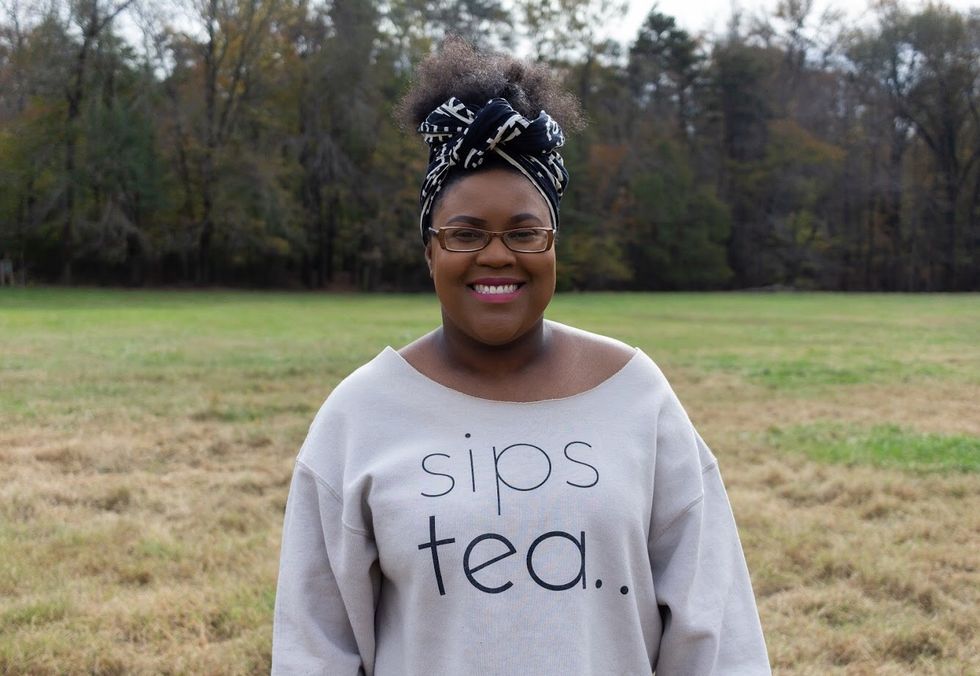
Courtesy of Shanae Jones
How did you come up with the title hip-hop herbalist?
It kind of came from other people. I'm happy too because I always wanted a nickname but I didn't get one (laughs). Now, I have one that I guess goes with my career, my passion. It just kinda came from the way I moved tea and I mixed it with herbs. [My] trap tea sort of took off on Twitter and this is just what it became, so that's how a lot of people [now] refer to me.
What was the concept behind hip-hop influenced herbal tea?
Well, I find that hip-hop is a great teaching tool and I see no reason why herbalism and herbal tea or any tea shouldn't be a part of that teaching. For me, it was quite simple; it was just very easy for me to see that connection between hip-hop and herbal tea. The common nature of hip-hop and also the common nature of herbalism and herbal tea. It's not considered highbrow medicine, and for a lot of people, hip-hop isn't considered this really incredible musical genre.
While I would disagree, there are parallels in that that also herbalism kinda deals with when it comes to conventional medicine. It was really easy for me to see the connection. I knew hip-hop, so [I] was like, I'm going to do something that I'm confident in and comfortable with and I can work with something I don't know much about.
I can make those parallels that people don't see. And I can bring it to people and make it plain for them to understand.
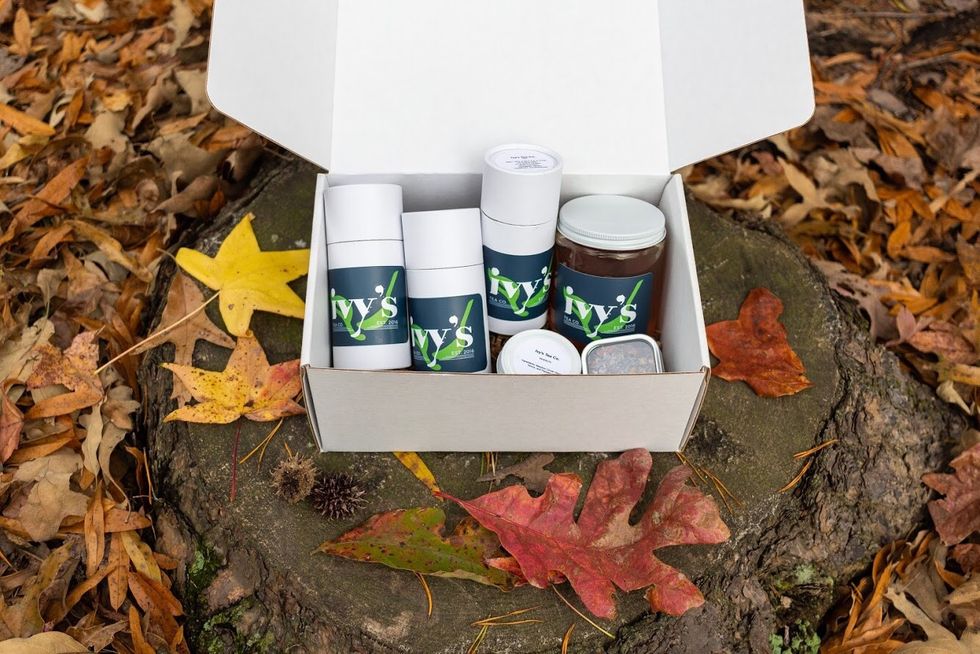
Courtesy of Shanae Jones
Why the name 'Ivy's Tea Co.'?
Naming a business is actually hard because you're like, 'I can't come up with anything!' But one day, it just rolled off the tongue.
I thought that I could name it after my grandmother. Her name was Ivy and she left Jamaica for a better life in London at a very early age. I think she was 16 or 17 years old. Ivy was kickass and very brave and I thought I should take that same energy and same spirit with me as I'm going on to do something very risky.
Being an entrepreneur is probably as risky as it gets and so I decided to name my company after her and it made sense and it sounded good. On the flipside, Ivy kinda smoked and she drank a lot. It probably wasn't the best idea to name a holistic health brand after her but her bravery was important to me and so I decided I would go with that.
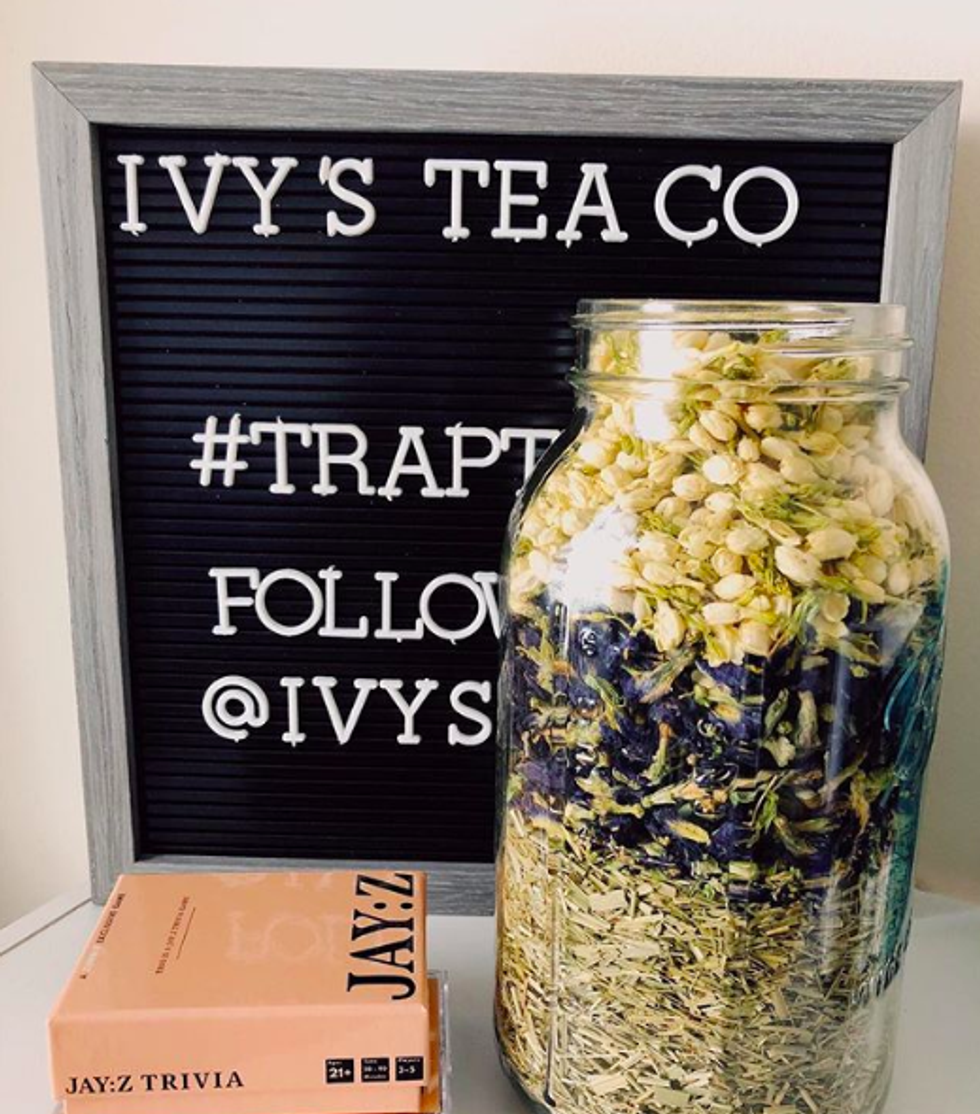
Courtesy of Instagram/ @ivysteaco
Do you believe your British-Jamaican heritage influenced you as an entrepreneur?
Sometimes I would like to say 'no,' but sometimes when I look back I could see, [for example] my family owned a Jamaican restaurant. When I was in middle school and high school, I would work there. I would leave school and take the bus to work with my mom and grandmother in the evenings. I saw my family working together and I saw the freedom of entrepreneurship but I think that's why when I think about it, it gave me a real glimpse of how hard it is.
My grandmother now, she doesn't clean chicken at all, you can't get her to touch a chicken because she cleaned so many while she was working at the restaurant. It showed me the grit and it showed me the staffing problems, delivery issues--how do you promote? How do you market? And this was at a time where there wasn't really [any] social media so it gave me a real insight on what it is to be an entrepreneur.
I learned not to quit and I learned that it's not as glamorous as people online would make it look, so I at least got to see that upfront.
I do drink a lot of tea and I always have ever since I was younger. That's how I bonded with my mother and grandmother, just over cups of tea. It's how I grew into womanhood, it's how I learned a lot about my family, that's how I learned about gossip and I learned about news and socio-political issues. I got to learn about my mother and grandmother over those cups of tea so I guess it was the one thing that introduced me to tea, but the tea I make now is so different than what we had and it's so different from what people tend to think of when they think of British tea.
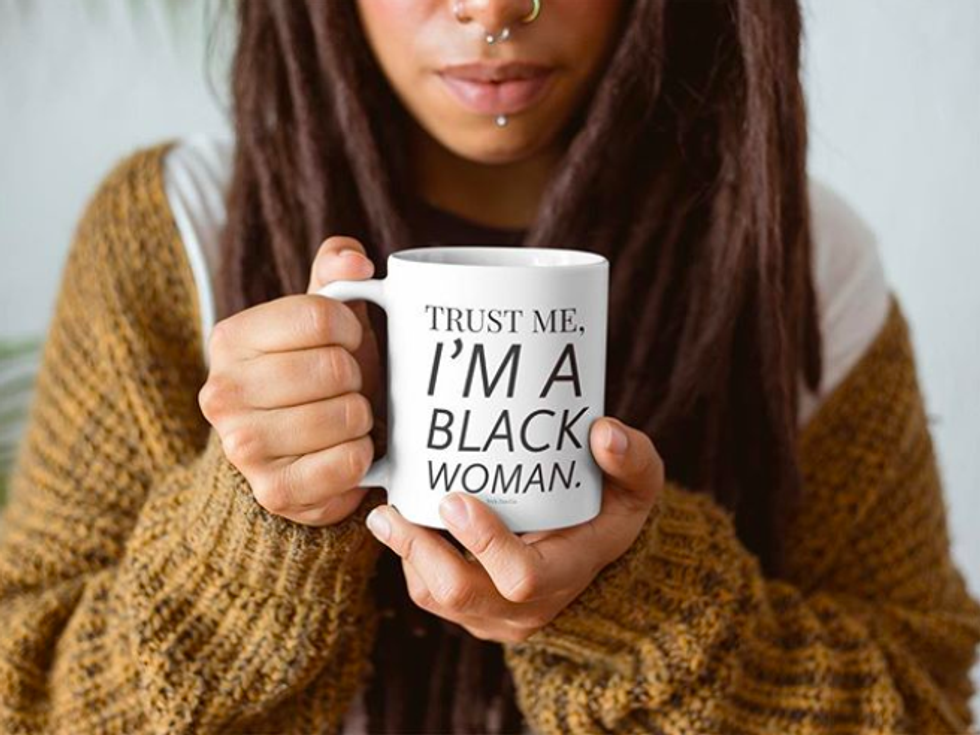
Courtesy of Instagram / @ivysteaco
Besides clever names like "PushaTea" and "What the Flu," what makes Ivy Tea Co. unique?
I'd say it's the mission behind the brand and that is to bring more black people into the holistic health industry and to change the scope of what holistic living is and what tea culture is.
The company is really all about shifting perspectives and subverting assumptions and in some ways, it is to offend people.
To get people to no longer take what they're used to and kinda flip it on its head and to say everything you think you know is wrong and I think that's really important as businesses grow and brands grow. There are lots of big trends we see about having a big face in front of the company and it's all about personality and how people buy into people and not brands per se but I feel that brands and businesses, in general, have the ability to shift American culture and the ability to create the America we want to see and mine is that I want to see a lot more inclusivity of black and brown people.
What are some obstacles you've encountered being a black woman in this space?
Well first off, a lot of people who drink tea don't think that hip-hop is necessary for it. They think that I should make it and make the brand, they would say, "more inclusive," but what they really mean is that they want to see less black people in the ad. They want the language to be a little "less black" but it's me.
When I make product descriptions online or I'm making a caption, it's my voice. I'm speaking the way that I speak on a regular basis not with any regard, it's not that I'm doing this intentionally, I'm just being my authentic self.
I also feel like the holistic health industry is full of wellness porn. Everybody's doing it, everybody's moaning, everybody is having a good time but they all got paid. It's not authentic, and I feel like I have to use my voice to kinda change that and of course, it's scary sometimes to be the first person over the hill, but I'm willing to do that.
I don't feel like I have much to lose, so I can take that chance but it is certainly a challenge. A lot of people don't want to see the brand the way that it is but I have proof of concept. I have customers who come back again and again. I have first time customers who come and are very appreciative of the fact that they can see themselves and hear themselves in the branding and that's enough for me to keep going because I know if I got them, then I can get one more and I can keep going and that's the point of the whole thing. I welcome the challenges. If it were too easy I think I probably would have quit by now.
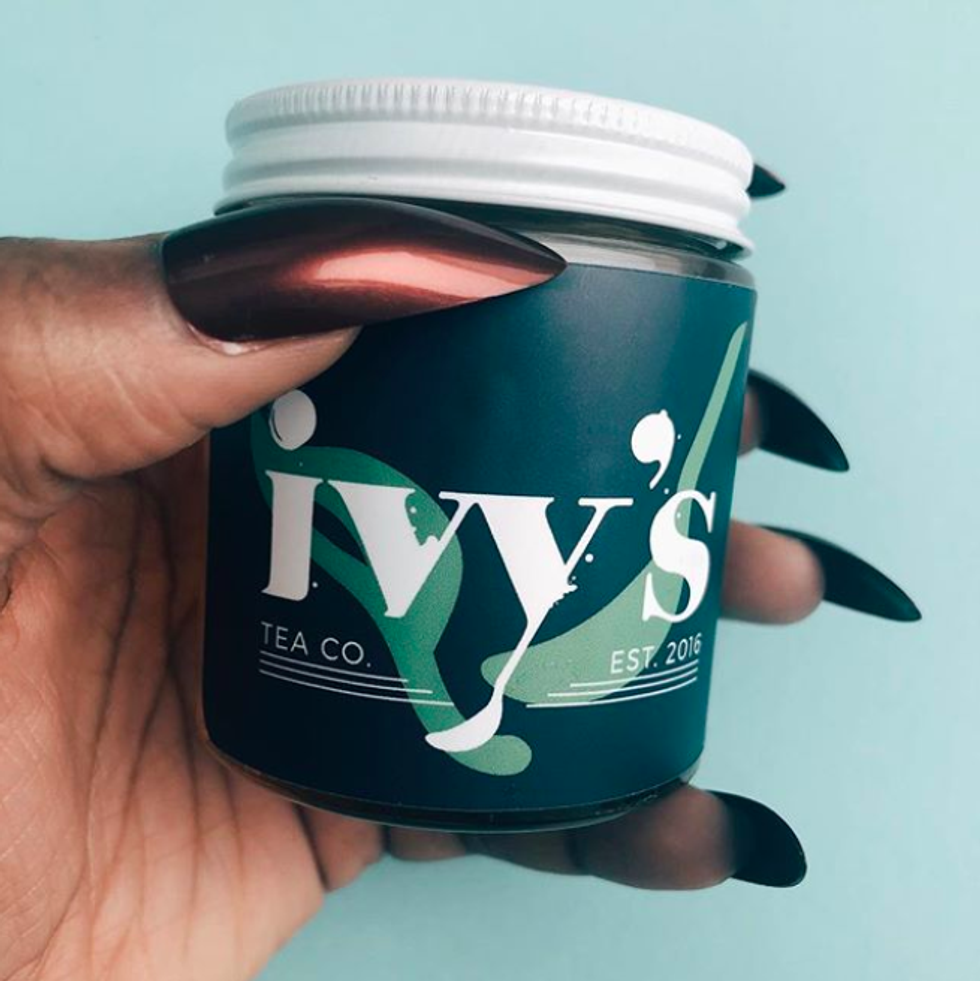
Courtesy of Instagram / @ivysteaco
We've seen a rise in holistic awareness especially in the black community, but there are still some misconceptions about holistic medicine. How does your herbal teas address that?
I try to step away from that. I don't feel that Ivy Tea Company is here to address any misconceptions. It's gonna be there no matter what but we are here to bring acceptance and inclusivity into the industry and to create a space with people who have questions about holistic health but don't look like or live like the typical wellness guru. I want those people to come to me and feel comfortable asking questions and I want them to feel invited to approach the industry.
We don't have a medical industry in this country right now [for] holistic medicine or even alternative medicine practices like homeopathy, for example. Outside of the states, they do all the time but there are big pharmaceutical companies and lots of money to be made, so anything that encourages you to do something outside of taking a pill is oftentimes discouraged.
That's what herbalists like myself have to overcome and so that's why I feel like I'm here to stand in the gap. That's why it's important that I do this work but that I get more involved and give back to the community in a way. I don't want to address the misconceptions but I'll at least add information to it to make it a little more understandable as something you can take in conjunction to what you already know as far as conventional medicine is concerned.
What are the benefits of living a more holistic life?
I can speak for myself and say that it is a more focused, much more disciplined life. I also have much more self-confidence. I'm just a lot healthier because when you have teas and things, it's typically dry herbs but also when I cook my own food now, I use fresh herbs. I'm like the parsley person now, you know black chefs love to put parsley on everything.
I'm using fresh mint, I'm using fresh basil, I'm more into green juices and I'm also more interested in it. I used to have dry scalp, I used to suffer from a lot of migraines, and I no longer have those problems so for me the benefits have been tremendous.
You can find her products on www.ivystea.com. Follow Shanae on Instagram @ivysteaco.
Related Articles:
The Power Of The Pivot: How CurlMix Plans To Reach $10 Million In Sales This Year - Read More
How Gia Peppers Is Becoming This Generation's Game-Changer One Talent At A Time - Read More
How Meditation Led Shelah Marie To Finding A Greater Love - Read More
- Meet The Hip-Hop Herbalist That's Merging Trap Music & Holistic ... ›
- Black Women In Hip-Hop - xoNecole: Women's Interest, Love, Wellness, Beauty ›
This Is How To Keep 'Holiday Season Stress' From Infecting Your Relationship
Hmph. Maybe it’s just me, but it seems like there is something really weird happening in the fall season air (because winter doesn’t officially begin until December 21) that cuddle season is in full swing while break-up season is as well. In fact, did you know that break-ups are so popular during the holiday season that December 11 is deemed Break-Up Day?
The reasons why relationships shift around this time vary; however, I did both roll my eyes and chuckle when I read that a very popular one is because it’s an easy way to get out of getting one’s significant other a Christmas present. SMDH.
Anyway, I personally think that the less shallow folks out here may contemplate calling things “quits” or they at least distance themselves a bit from their partner (and what I’m referring to is serious relationships) due to all of the stress and strain that oftentimes comes with the holidays whether it be financial, familial, due to their tight schedules or something else.
Listen, I would hate for you and your man to miss the fun and happiness of experiencing this time of year, all because you are so overwhelmed or irritated that you can’t really enjoy it. That’s why I have a few practical tips for how to avoid allowing the typical holiday season stress from INFECTING your relationship.
Manage Your Expectations
 Giphy
GiphyUnmanaged expectations. If there is a main reason why the holiday season tends to be so stress-filled for so many people, I’d bet good money that this is the cause. And when you’re in a long-term relationship, expectations can manifest themselves in all sorts of cryptic and/or unexpected ways. You might have relatives who assume that you are going to be with them for Thanksgiving or Christmas when you have other plans in mind. You might be thinking that you are going to spend one amount for presents while your man is thinking something totally different. When it comes to scheduling, your signals may be crossed.
And you know what? To all of these scenarios, this is where clear and consistent communication come in. Don’t assume anything. Don’t dictate anything either. From now until New Year’s, mutually decide to check in once a week, just to make sure that you are both on the same page as it relates to the holidays and what you both are thinking will come along with it. The less blindsided you both feel, the less stressed out you will be. Trust me on this.
Set (and Keep) a Budget
 Giphy
GiphyOkay, so I read that last year, 36 percent of Americans incurred some type of holiday-related debt. Hmph. Last year, there was still some sense of normalcy in this country, chile, so I can only imagine what finances are gonna look like over the next several weeks. That said, since I don’t know a lot of people who don’t find being broke stressful, make sure that you and your bae set a budget and then stick to it this year — no ifs, ands or buts.
Because really, y’all — it doesn’t make sense to deplete savings and/or max out credit cards for a few days of giggles only to be damn near losing your mind because you don’t know how to make ends meet come Dr. Martin Luther King, Jr. Day.
And by the way, this tip doesn’t just speak to things like food and gifts; I also mean travel. If it doesn’t make a ton of sense (or cents) to be all over the place this year — DON’T BE.
Keep Matthew 5:37 at the Forefront
 Giphy
GiphyIf off the top of your head, you don’t know what Matthew 5:37 says, no worries, here ya go: “But let your ‘Yes’ be ‘Yes,’ and your ‘No,’ ‘No.’ For whatever is more than these is from the evil one.” That verse right there? Oh, it’s a boundaries lifesaver! I say that because do you see “maybe” or “I’ll think about it” in there? Nope. LOL. It says that you should tell people “yes” or “no” and leave it at that — and that complements Anne Lamott’s quote, “’No’ is a complete sentence” impeccably well. Yeah, you’ve got to remember that anything beyond a yes or no to a request is privileged information; you don’t owe anyone details or an explanation.
Besides, if you are really honest with yourself, when someone asks you something and you give a “Umm, let me think about it” kind of reply, more times than not, you already know what your answer is going to be — so why not let you both off of the hook? Give your response. Commit to that. And let everyone (including yourself) get on with their lives and schedules.
I promise you that when it comes to those holiday parties, you are pissing more folks off by not RSVP’ing or doing so and not showing up than just saying, “Thank you but not this year” off the rip.
Remember That Your Personal Space Is Privilege Not a Right
 Giphy
GiphyA friend of mine recently bought a new house and invited me over to come see it. He’s a single man with no children, so as I was taking in all of the space that he had, especially as I walked through his finished basement, I joked about relatives coming to live with him. “Hell no” and “absolutely not” were pretty much his immediate responses as he went on to say that some folks even had the nerve to be offended when he told them that he had no intentions on taking DNA in.
Ain’t it wild how people think that your stuff is their right? And yes, that brings me to my next point. Your home is your sanctuary space. If you want to host folks this year — cool. If not, ALSO COOL. Please don’t let folks (family included) guilt you into how they want you to act or even into what they would do if the shoe was on the other foot. You are not them — and as one of my favorite quotes states, “If two people were exactly alike, one of them would be unnecessary.” (A man by the name Larry Dixon said that.)
Hell, my friends? They know that I am good for sending them random things that they need or even want all throughout the year. Coming over to hang out at my pace, though. Uh-uh. Chalk it up to being a card-carrying member of the ambivert club yet I like keeping my living space personal — and I sleep like a baby, each and every night, for feeling that way.
Always remember that your space, your time, your resources, your energy and shoot, yourself period (including your relationship), are all things that are your own. You get to choose how, when and why you want to share them. The holiday season is certainly no exception.
Cultivate Some “You Two Only” Traditions
 Giphy
GiphyIt’s not uncommon for some couples to hit me up after the holiday season to “detox.” Sometimes it’s due to the financial drama (and sometimes trauma) that they experienced. Sometimes it’s because they allowed their relatives (especially in-laws) to get more into their personal business than they should’ve. More than anything, though, it tends to be because they didn’t get enough quality time together and so ended up feeling “disconnected.”
Please don’t let that happen. Listen, I’m not even a holidays kind of woman and yet, I will absolutely sit myself down with some hot chocolate and chocolate chip cookies to enjoy a Hallmark holiday film or two. Aside from the fact that most of them are lighthearted and sweet, I also like that they usually focus on couples loving on each other amidst all of the holiday beauty and ambiance — which is something that all couples should set aside some time to do.
Maybe it’s a vacation. Maybe it’s a staycation. Or maybe it’s my personal favorite, A SEXCATION. Whether it’s for a few days, the weekend or even overnight — don’t you let the holidays go by without setting aside time for you and your man to celebrate one another. Don’t you dare (check out “Are You Ready To Have Some Very Merry 'Christmas Sex'?”).
GET. SOME. REST.
 Giphy
GiphyI once read that 8 out of 10 people get stressed out over the holidays and 3 out of 10 lose sleep during to it — and when you’re stress-filled and sleep-deprived, that can absolutely lead to hypersensitivity, making mountains out of molehills and even not being in the mood for sex.
Your relationship can’t afford to go through any of this, so definitely make sure to prioritize rest. I don’t care how unrealistic it might seem during this time, sleep should never be seen as a luxury; it will always and forever be a great necessity.
That said, try to get no less than six hours of shut-eye in (check out “6 Fascinating Ways Sex And Sleep Definitely Go Hand In Hand”) and even ask your bae to take a nap with you sometimes (check out “Wanna Have Some Next-Level Sex? Take A Nap, Sis.”). Not only will sleep help to restore your mind, body and spirit but, when it’s with your partner, it’s an act of intimacy that can make you both feel super connected, even in the midst of what might feel like chaos.
___
Holiday season stress is real. Still, never give it the permission or power to throw your relationship off. Put you and your man first and let the holidays be what they are gonna be, chile.
Let’s make things inbox official! Sign up for the xoNecole newsletter for love, wellness, career, and exclusive content delivered straight to your inbox.
Featured image by Shutterstock
Here's What 2026 Has In Store For You, Based On Your Zodiac Sign
2026 is a year of love, growth, and reflection. As a universal 1-year, 2026 is signifying a time of new beginnings. New doors open, and this is the perfect space to build new foundations, relationships, and successes in your world. This year is about what you do with what you are receiving and understanding the power of intention and innovation.
It’s about having balance between your individual needs and the needs of your relationships, and knowing that you can have it all. 2026 reminds us of the importance of community, and new bridges will be built.
Overall, this year has some pleasant and unexpected surprises in store, and this is the year to follow your heart.
Key Astrological Transits of 2026
June 30: Jupiter Enters Leo
Jupiter enters Leo this year until 2027, and this is especially good news for fire signs: Leo, Aries, and Sagittarius, and for fixed signs: Aquarius and Scorpio. Jupiter in Leo is grand, regal, and over-the-top, and you can expect a lot of this energy in 2026. This is the time to own your creativity, your self-empowerment, and what makes you shine in life. You can align with the blessings of Jupiter by aligning with your heart and what makes you truly happy in life. This year is about being confident in your inner knowing and showing up.
July 27: North Node in Aquarius/South Node in Leo
The North Node moves into Aquarius, and the South Node enters Leo mid-year until 2028, and this is instrumental for the collective. With the North Node in Aquarius, authenticity is the direction to be heading. More people will be showing up exactly as they are, and feeling confident in their unique signature in life. We are letting go of the need to always be put together or be seen as “perfect” and embracing more community, genuineness, and eccentricity. New technological advances that shift the world are also more likely with the North Node in Aquarius.
October 3: Venus Retrograde in Scorpio/Libra
Venus goes retrograde every other year, and 2026 is a Venus Retrograde year. Venus will be retrograde in Scorpio from October 3 until October 25, and it’s important to be patient in matters of love and not to rush into things here. Take the time to get to know your past, present, and future in love better at this time, and don’t overcommit to things you don’t have the energy to see through. Venus will then be retrograde in Libra from October 25 until November 13, and this retrograde period brings you closer to the partnerships that serve you in life and helps you reflect on what these relationships may need to feel more stable and secure.
Overall, we are gaining clarity in love this year.
Read for your sun and rising sign below to see what 2026 has in store for you.
ARIES
This year is about putting yourself and your dreams first, Aries. You are on the path towards abundance, and your to-do list is piling up. This is the year to be confident in the things you are developing, consider all perspectives, and open up to new opportunities. Saturn, the planet of strength, hard work, and dedication, is in your sign for the entire year, and you are overcoming. Saturn tends to challenge you more than anything, and this year, it's challenging you to evolve.
This is the year to create a new plan and take the steps needed to fulfill it.
With Neptune also in Aries for the entire year, you have wisdom, creativity, and imagination on your side, and 2026 overall is the year to believe in the impossible. Connecting more deeply with your spirituality is also serving you this year, as you define your belief systems, interests, and inspiration, and let life guide you. It’s all about having balance this year, Aries. Move when you feel inspired to move, and allow when you feel ready to let go and receive.
TAURUS
2026 is your year of connection, collaboration, and increasing your earnings, Taurus. You are walking into the year full of empowerment and vision, and you know what you want to accomplish and who you want to accomplish it with. Opportunities to work with others and create something beautiful in your world are more prevalent this year, and you have the Midas Touch in 2026. This year is all about dedicating yourself to your dreams and being proud of yourself and your efforts.
The New Moon in Taurus on May 16 is a groundbreaking moment for you in 2026, and a time when you feel like you are embarking on a new chapter in your life. Embrace the opportunities that come your way mid-year, and know that you have what it takes to succeed. On June 19, Chiron, the wounded healer, enters your sign, and you enter a new journey of getting to know yourself, your past, and your inner world better.
Chiron will be in Taurus until September 17, will briefly enter Aries until April 2027, and then will transit back into your sign until July 2033, so there is time, but overall, you are opening the door to healing this year.
GEMINI
2026 is a transformative year for you, Gemini. You are awakening to new ideas, insight, and experiences, and it can feel like there is a lot to take in right now. This is your year of embarking on a new journey and defining what you want for yourself. Things change, perspectives shift, and it’s about what you do with what you know now. Uranus, the planet of upheaval, change, and rebellion, is in your sign from April 25 until May 2033, and this year is about expecting the unexpected.
Know that everything happens for a reason, and what transforms for you now is creating the space for new life to grow.
Jupiter, the planet of blessings and expansion, also changes signs this year, and for you, this means a new outlook on life altogether. Jupiter will be in your 3rd house of communication from June 30 until July 26, 2027, and the vision is there for you. This is a great year for publication, writing, short travels, social media, and networking, and you are learning how to take up space right now. Overall, 2026 is about getting the answers you have been looking for, feeling empowered to express yourself, and allowing transformations to move you into a new beginning.
CANCER
This year is about knowing you are supported and finding your strength, Cancer. You have been working hard on building the things that matter to you and finding your stability in life, and this year is that last push towards your dreams. You have been protecting your energy and your peace; however, this year reminds you that remaining overly vigilant can hinder you from being open to new opportunities that can actually serve you in life.
Remember to listen to your intuition more than your fears this year, and trust that you are being guided in the right direction.
We begin the year with a Supermoon in Cancer on January 3, and end the year with a Supermoon in Cancer on December 23 as well. This is major news, and points to some life-changing closures, culminations, and inner awakenings happening for you in 2026. With Jupiter also in your sign until June 30, luck is still on your side right now. Your life is expanding, and it’s time to catch up to the new chapters that want to take place for you by letting go of what hasn’t been working.
This year isn’t about sticking to what is comfortable; it’s about opening your mind and your heart to new possibilities.
LEO
2026 is your year of freedom, success, and stability, Leo. You have a lot of things working out for you this year, and it’s because you have done the work and trusted yourself and your unique journey in the process. The mountains you have climbed are behind you now, and you are ready to experience the fruition of the intentions you have set for yourself. Jupiter, the planet of luck, moves into your sign this year from June 30 until July 26, 2027, and you enter a fortunate time in your life.
With Jupiter in Leo, all eyes are on you, new opportunities come into your life, and you are feeling sure of yourself.
This year not only empowers you, but it also helps you let go of what has been disrupting your healing journey. The South Node enters Leo from July 2026 until March 2028, and you are moving through the process of getting to know yourself and your past better. You are going over the things you have identified yourself with, the experiences that have shaped you into the person you are today, and what this all means for the way you experience life overall today. This year is about evolving, letting go, and claiming new blessings.
VIRGO
2026 gives you perspective, Virgo. This year is a new beginning for you altogether, and you are taking things one step at a time. The vision is clear, the intentions are set, and you know what needs to be done to live a life of fulfillment. With the South Node in Virgo until July 26, you are still in the process of healing from the past, discovering new truths about yourself, and rewriting your story. This is a defining year for you, and the confidence you have in your vision for the future is creating new success, connections, and opportunities for yourself.
This year is about speaking up, gaining clarity, and being the star of your world.
With a Lunar Eclipse in Virgo on March 3, you are moving into the year with the need for closure and redemption. You have been through the process of letting go and creating anew, and this back-and-forth energy finally comes to a close for you at this time. You have taken care of yourself and your dreams, and now it’s time to allow yourself to be taken care of more and to embrace the new success that wants to come into your life. Know that sometimes things just work out without reason, and that when little miracles happen for you this year, accept them.
LIBRA
2026 is all about having patience, setting new intentions, and sticking to the plan, Libra. You are walking into the year with a lot of responsibilities on your plate, but it’s nothing you can’t handle or delegate. Look for new resources and opportunities this year, and don’t allow yourself to get caught up in the timing of it all. Things happen when you least expect them to, and it’s about trusting that things are working out behind the scenes for you right now.
With Jupiter moving into your 11th house of friendships this year, your support systems are instrumental to your growth in 2026 and will be a guiding force of love and community for you.
As you walk into the year, write a list of the defining experiences you want to have this year. Don’t have any expectations on the timing of it all or how exactly things will play out for you; leave that up to the universe. However, create the plan and get the vision going. With Venus going retrograde in your sign at the end of the year, from October 25 through November 13, you will be leaving this year with more clarity of the heart.
Relationship dynamics shift, and you are recognizing more of what your heart needs in order to feel seen, supported, and abundant.
SCORPIO
This is a powerful year for you, Scorpio. 2026 is all about living out your dreams and experiencing the successes you have been working towards. You have set the intentions and done the work, and the manifestations you once dreamed of come into your reality. This year is about getting your ducks in a row, preparing yourself for the opportunities you have wanted, and knowing that you are exactly where you are meant to be.
You are entering a year of empowerment and abundance, and are owning your independence and positive energy in the process.
Jupiter, the planet of fortune and good luck, moves into your house of career and achievements mid-year, and you are accomplishing some major feats. Your career and professional life are taking off, and you are a hot commodity in 2026. This is your year of believing in yourself wholeheartedly, and not self-sabotaging the good that is in front of you. At the end of the year, Venus goes retrograde in your sign from October 3 until October 25, and your heart is doing some healing, reconnecting, and self-reflecting. Overall, this is a major year of growth for you, and you are moving through life head-on.
SAGITTARIUS
2026 moves quickly for you, Sagittarius. You are experiencing some renewed enlightenment, and this is an important year for communication matters. It’s about trusting your process, not rushing into anything, and allowing your mind to catch up to your body. Be careful with being too impulsive this year, but overall, trust that you will know what you need to know when you are ready to. Life is expanding for you overall in 2026, and your mind is expanding in the process. Pay attention to the conversations you are having this year, as this is when a lot of things are shifting for you.
With Saturn in your 5th house of romance for the entire year, you are on a journey of redefining what happiness means to you.
Have you been putting your positive experiences, happiness, and romantic life on the back burner too often? This is where massive changes are taking place for you this year, and when you get a better look at what you need to feel truly fulfilled and your heart a little lighter. On June 30, Jupiter, your ruling planet, moves into your 9th house of travel and adventure, and this is when things really start picking up for you this year. You are crossing off your bucket list as you move through 2026, and learning something new about yourself and the world around you in the process.
CAPRICORN
2026 is all about taking on new opportunities and owning the momentum you feel in your life right now, Capricorn. This is a fast-moving year for you, and things happen in the blink of an eye. You are feeling motivated towards your new beginnings and are experiencing a lot of support and fortunate opportunities that you have been looking forward to in the process. It’s about taking more time to listen to your intuition and instincts and trusting that you are making the best decisions for yourself.
With Saturn, your ruling planet, in your 4th house of home this year, you are rebuilding your safe spaces right now.
Dynamics shift, and this is helping you get a clearer view of what is working and what isn’t working for you regarding family life, home, financial security, your inner world, and how you process things here. With the North Node also moving into your house of communication mid-year, you are learning more about the power of your thoughts and the words you put out there. This year is about speaking into existence what you want to happen and understanding the power you hold as the creator of your life.
AQUARIUS
2026 is the year of owning the balance you have found in your life, Aquarius. You are giving and receiving freely, and feeling more abundant than you have in a while. Things just flow and work out for you in 2026, and it’s time to own that you deserve this energy. You have been putting into place and preparing for the things that are finally happening for you this year, and it’s time to feel good about it all. This year reminds you that you are worthy of freedom, abundance, and success, and that the more you embrace this knowing, the more it becomes your reality.
We enter the year with a Solar Eclipse in Aquarius on February 17, signifying a year of new beginnings, change, and personal growth for you.
Who you are when you enter the year is a different person from who you are when you leave it, and you are feeling more like yourself overall. The North Node of Destiny also enters your sign this year on July 26 until March 2028, and you embark on a journey of blessings. Life changes dramatically for you over the next few years, and this year is that first step towards change. You are owning your independence while also understanding the importance of the relationships that are growing for you this year.
PISCES
This year is about allowing life to come full circle and trusting that you are supported along the way, Pisces. There is a lot to think about and process this year, and it’s important to be a little kinder to yourself. Give yourself grace and know that you will move through this time and overcome what is needed. With the North Node in your sign until July 26, rewriting your destiny, you have the power to make some massive shifts in your life this year and to truly align yourself with the vision you have for your future that supports your abundance, power, and intentions.
It can feel like a lot is happening at once this year, and it’s important to focus more on your perspective of it all.
If you are focusing more on the things that aren’t working out for you or comparing your journey to others, you might feel disheartened and stagnant. The Lunar Eclipse in Pisces on August 28 is the perfect opportunity for growth for you, and when you can really let go of the self-sabotage or fears that have made you overthink your blessings. Overall, this year is a reminder that you are worthy, loved, and intelligent, and you can make the best decisions for yourself.
Featured image by Shutterstock
Hollywood Beauty has been a staple brand in many Black households due to their variety of oils for hair and skin. You could always find them at your local drug store or hair store making them readily accessible and the price was always right. Growing up, I would get hot oil treatments regularly with Hollywood Beauty's Tea Tree Oil and Olive Oil.
Now, they have a new collection of oils that are a blend of ingredients that promote healthy skin and hair. Introducing Hollywood Beauty's Level Up Collection.
This collection features a medley of oils: Glo Up! Turmeric, Vitamin C + Aloe Daily Skin & Scalp Oil, Gro Up! Rosemary, Mint + Biotin Daily Skin & Scalp Oil, and Thick'N Up! Multi-Vitamins, Sea Moss & Amla Daily Skin & Scalp Oil. I had the opportunity to try these oils on my hair and skin, and this was my experience.
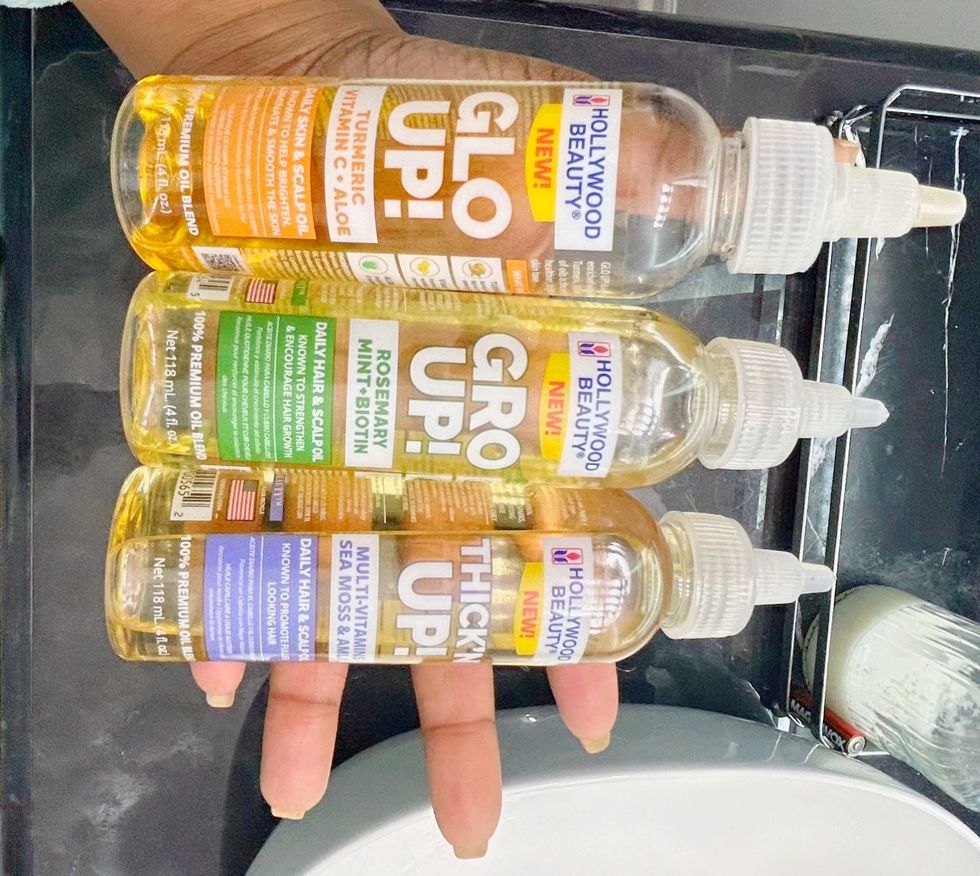
Courtesy
Glo Up! Turmeric, Vitamin C + Aloe Daily Skin & Scalp Oil
This oil came right on time as I was in the process of getting rid of dark spots that appeared on my legs following the mosquito bites I received on a trip. With ingredients like turmeric and vitamin c that are known to brighten the skin, I was hopeful that this oil will help fade the spots. After using it daily for a few weeks, I noticed a slight difference. So I plan to continue using it as part of my daily routine.
Gro Up! Rosemary, Mint + Biotin Daily Skin & Scalp Oil
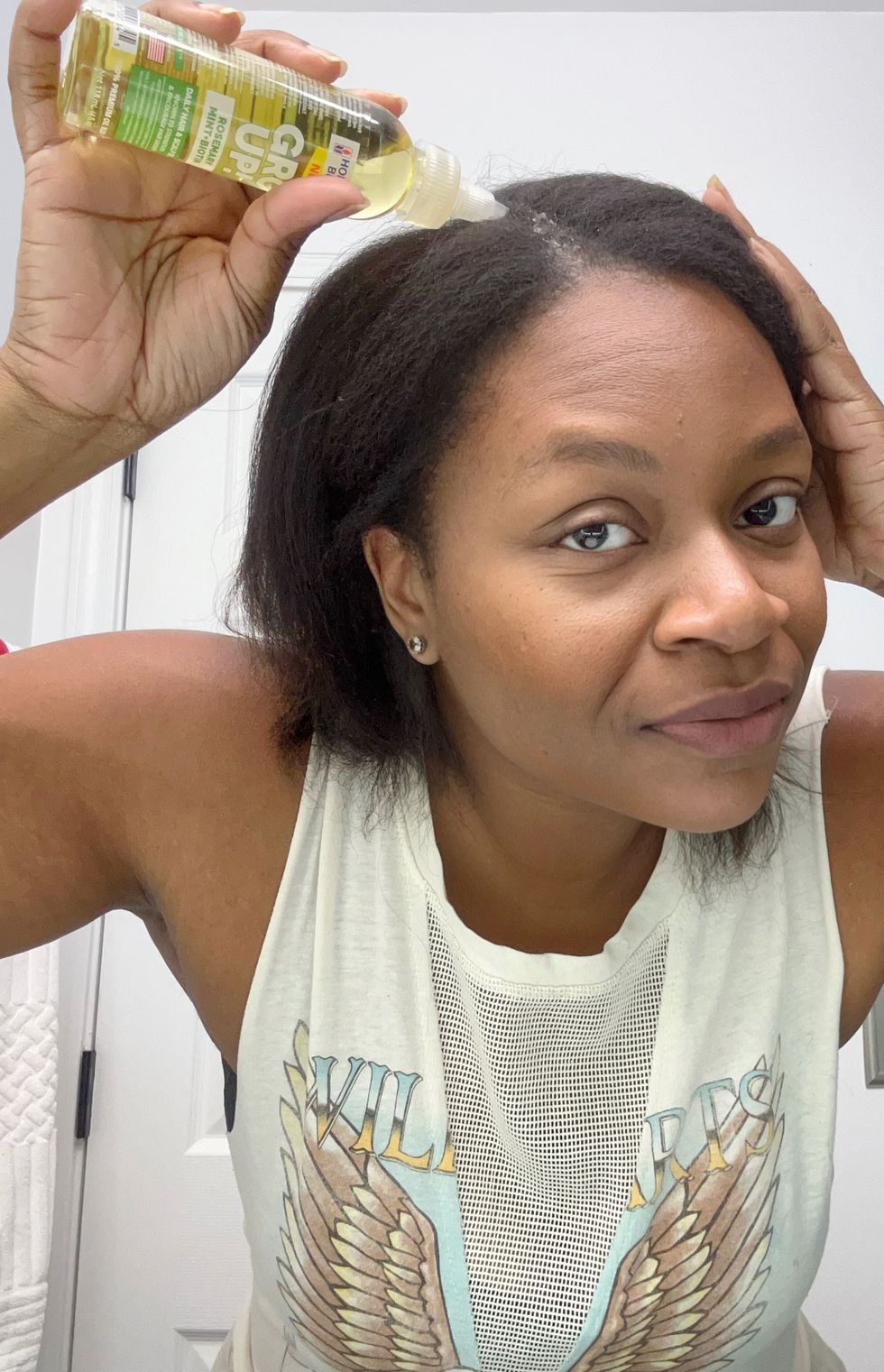
Courtesy
Rosemary is one of my favorite herbs to use in my hair care. I make my own rosemary water, I use a rosemary and rice water conditioner, and I love using rosemary oil. So when I received Hollywood Beauty's Rosemary, Mint + Biotin oil, I was excited to try it.
After one use, I knew that this will become a go-to oil for my hair. I like to apply the oil on my ends and brush it throughout my hair for a luxurious feel. The mint makes my scalp tingle and with the addition of biotin, I know my hair is getting stronger.
Thick'N Up! Multi-Vitamins, Sea Moss & Amla Daily Skin & Scalp Oil
Sea moss has become popular over the years due to its rich nutrients and mineral content. So my experience with sea moss has always been through ingestion. I never thought about using it in my hair and body care, until now. Thanks to Thick'N Up! Multi-Vitamins, Sea Moss & Amla Daily Skin & Scalp Oil, I was up for the challenge.
This oil was made to help thicken your hair and condition the scalp. Amla is also another popular ingredient that is used in the oil to fight dandruff and promote hair growth. I've been on my hair growth journey, so this oil is a must-have.
Featured image courtesy


